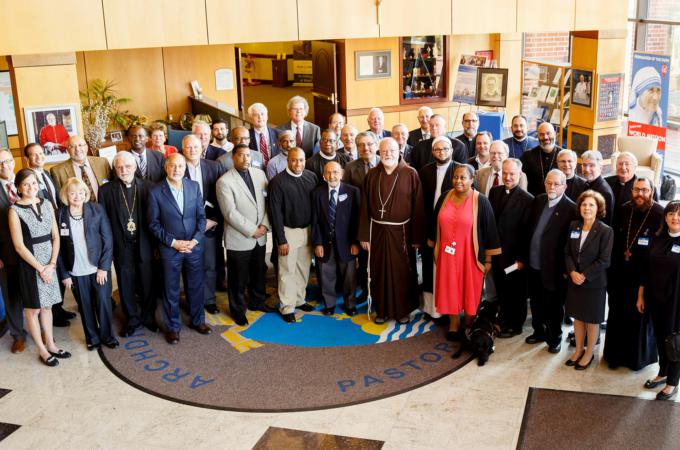Cardinal O'Malley urges faith leaders to oppose recreational marijuana
A group of about 40 faith leaders from around the Boston area gathered at the Archdiocese of Boston's Braintree headquarters Oct. 18 to discuss their opposition to Massachusetts ballot Question 4, which would legalize the recreational use of marijuana in the Commonwealth.
According to organizers, the gathering included representatives from the African Methodist Episcopal, Armenian, Baha'I, Baptist, Black Ministerial Alliance, Coptic, Episcopal, Evangelical, Greek Orthodox, Hispanic Evangelical, Lutheran, Maronite, Melkite, Muslim, Evangelical Campus Ministers, Pentecostal communities.
A number of local Jewish leaders were unable to attend the meeting due to observances of the Festival of Sukkot.
Opening the packed lunchtime meeting, Cardinal Seán P. O'Malley thanked the faith leaders for their willingness to attend on "such short notice," the meeting being organized only days before.
The cardinal explained that when the ballot initiative first arose, he felt a "false sense of security" that the measure would not pass after major political figures, such as Gov. Charlie Baker and Boston Mayor Martin J. Walsh, and numerous public health and law enforcement groups came out against it. However with the vote only weeks away, and with polls showing support for legalized recreational marijuana, he realized it was time for faith leaders to act to educate the public on the initiative, which he called a "real, present danger."
Following the Cardinal's remarks, the religious leaders heard from George Cronin, managing director of Rasky Baerlein Strategic Communications, who provided a brief overview of the status of all four ballot questions that will be decided by voters this Nov. 8.
The bulk of the nearly two hour meeting consisted of a presentation by Plymouth Republican State Sen. Viriato "Vinny" deMacedo.
deMacedo was one of eight Massachusetts state senators who participated in a fact-finding trip to Colorado earlier this year to learn more about that state's experience with recreational marijuana and has since become a leading opponent of Question 4.
deMacedo explained that he believes there is a widespread misunderstanding that Question 4 is about decriminalization of marijuana possession.
However, he pointed out, Massachusetts already decriminalized possession of small amounts of marijuana in 2008 and use of marijuana for medical purposes was legalized after being approved by a 2012 ballot question.
"Nobody is going to jail for smoking marijuana, or having in their possession less than an ounce," which deMacedo described as representing between 25 and 35 marijuana joints.
Instead, he argued, he believes the push for expanded marijuana use in Massachusetts is backed by out-of-state investors.
"This is not a homegrown, grassroots organization in Massachusetts that wants this," said deMacedo.
"Knowing, specifically, (that) not a lot of people are concerned about marijuana, and so thus, they figured this might be a good investment," he continued.
Proponents of Question 4 say that legalizing recreational marijuana will regulate and tax what is now an underground industry, while allowing local control and not changing current impaired driving laws or workplace drug rules. They also reject claims that teen drug use will increase or that marijuana acts as a "gateway" drug.
deMacedo noted that, under the proposed ballot initiative, Massachusetts would only receive a 3.75 percent excise tax on marijuana sales, in addition to the regular sales tax. In contrast, in Colorado purchasers pay a 10 percent tax rate, while in Oregon they pay 25 percent and in Washington 37 percent.
He also contended that much, if not all, of any increased revenue to the state from marijuana sales would be eaten up by the cost of regulating the industry.
deMacedo went on to explain how marijuana has increased in potency over the years, noting in particular that the THC content (THC is the principal psychoactive constituent in cannabis) in the marijuana of today is significantly higher than the THC content of marijuana from the 1970s or 1980s.
Today, he added, about half of the marijuana industry consists of edibles, or food that has been infused with cannabis. Edibles can take numerous forms, including cookies, brownies, butter, different types of candy, and even lip-balm, deMacedo said.
He said these edibles can contain large amounts of THC, and may be seen as more attractive or socially acceptable than smoking marijuana, potentially increasing use. He also added that, because edibles resemble everyday products, they could easily be accidentally consumed by children or even pets.
He also raised concerns over increased impaired driving and challenged the idea that legalizing marijuana for recreational use would eliminate black market sales.
He explained that if the law passes, individuals would be allowed to grow up to six marijuana plants, with a limit of 12 per household. While it would be illegal for individuals to sell marijuana, it could be tempting for people to sell the marijuana they grow, he said.
"There are going to be people that say 'You know what? I can make a couple of bucks,'" said deMacedo.
The session ended with questions from the faith leaders, several of whom said they had been unaware of many aspects of the ballot measure, and pledged to raise awareness in their communities and congregations.
Speaking to The Pilot Oct. 19, Cardinal O'Malley said he "was pleased to see the enthusiastic response of the clergy and leaders from other faith communities who joined us for the meeting."
The cardinal also urged Catholics to, "become informed about the legislation and share the facts with their friends and family."
"I think there are a lot of people who are completely ignorant of what this law is. Some think it's just about decriminalization and they don't want to see so many people arrested. But that's already been dealt with former legislation," he added.
"We're talking about embedding a marijuana industry in the Commonwealth of Massachusetts that will be enormous, and have a huge impact on the lives of people and their families -- and this will be a negative impact," he said.



















